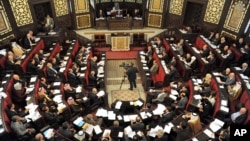BEIRUT —
Syria's parliament has set residency rules for presidential candidates, state media said on Friday, a move that would bar many of President Bashar al-Assad's foes who live in exile as the uprising in the major Arab state enters its fourth year.
Assad has not yet announced whether he will stand for a third term in defiance of rebels fighting to overthrow him and Western leaders who have demanded he go to help end Syria's civil war and make way for a democratic transition. But in state-controlled parts of the capital Damascus, preparations for his candidacy are unmistakable.
U.N.-Arab League peace mediator Lakhdar Brahimi has warned that the Syrian opposition will probably not be interested in pursuing any peace talks with the government if it goes ahead with an election highly likely to secure a new term for Assad, whose family has ruled Syria for 44 years.
“Section 30 of the draft law stipulates that candidates for the office of president of the republic must ... have maintained continuous, permanent residence in the Syrian Arab Republic for a period of no less than 10 years at the time of seeking nomination,” the Syrian state news agency SANA said.
No one in the opposition has announced an intention to challenge Assad in elections that are due to be held by July. Many have lived outside of Syria since before the revolt began in March 2011, and more left in the ensuing security crackdown.
The Western-backed opposition Syrian National Coalition, whose leaders are outside Syria, maintains a provisional government for rebel-held areas based in Istanbul.
The legislation sets further conditions requiring candidates to be at least 40 years old, to hold Syrian citizenship only, to be a child of Syrian citizens and married only to a Syrian citizen, and to be free of criminal convictions.
Many of these terms, including the residency requirement, were introduced as amendments to the constitution approved in a referendum two years ago.
Two rounds of peace talks mediated by Brahimi in Geneva earlier this year failed to bring the sides closer to agreement on a transitional government or a halt to the fighting that has killed more than 146,000 people.
In comments published by SANA, Syrian Information Minister Omran Zoabi said the coming election would be “a real contribution to combatting terrorism and violence”.
He said state media would be neutral in dealing with all candidates and the state would maintain the security needed for Syrians “to practice this national duty”.
But a French diplomatic source told Reuters the proposed vote would effectively kill any Geneva peace process as the talks were predicated on steps towards a democratic transition.
French foreign ministry spokesman Romain Nadal said France wanted “a quick and sincere return to negotiations.
“That implies that the Damascus authorities accept the agenda proposed by Brahimi and give up on the organization of a presidential election outside the framework of the Geneva communique and transition,” he told a news briefing in Paris.
Nadal was referring to a document agreed by the United Nations and world powers as the basis for peace talks.
Assad has not yet announced whether he will stand for a third term in defiance of rebels fighting to overthrow him and Western leaders who have demanded he go to help end Syria's civil war and make way for a democratic transition. But in state-controlled parts of the capital Damascus, preparations for his candidacy are unmistakable.
U.N.-Arab League peace mediator Lakhdar Brahimi has warned that the Syrian opposition will probably not be interested in pursuing any peace talks with the government if it goes ahead with an election highly likely to secure a new term for Assad, whose family has ruled Syria for 44 years.
“Section 30 of the draft law stipulates that candidates for the office of president of the republic must ... have maintained continuous, permanent residence in the Syrian Arab Republic for a period of no less than 10 years at the time of seeking nomination,” the Syrian state news agency SANA said.
No one in the opposition has announced an intention to challenge Assad in elections that are due to be held by July. Many have lived outside of Syria since before the revolt began in March 2011, and more left in the ensuing security crackdown.
The Western-backed opposition Syrian National Coalition, whose leaders are outside Syria, maintains a provisional government for rebel-held areas based in Istanbul.
The legislation sets further conditions requiring candidates to be at least 40 years old, to hold Syrian citizenship only, to be a child of Syrian citizens and married only to a Syrian citizen, and to be free of criminal convictions.
Many of these terms, including the residency requirement, were introduced as amendments to the constitution approved in a referendum two years ago.
Two rounds of peace talks mediated by Brahimi in Geneva earlier this year failed to bring the sides closer to agreement on a transitional government or a halt to the fighting that has killed more than 146,000 people.
In comments published by SANA, Syrian Information Minister Omran Zoabi said the coming election would be “a real contribution to combatting terrorism and violence”.
He said state media would be neutral in dealing with all candidates and the state would maintain the security needed for Syrians “to practice this national duty”.
But a French diplomatic source told Reuters the proposed vote would effectively kill any Geneva peace process as the talks were predicated on steps towards a democratic transition.
French foreign ministry spokesman Romain Nadal said France wanted “a quick and sincere return to negotiations.
“That implies that the Damascus authorities accept the agenda proposed by Brahimi and give up on the organization of a presidential election outside the framework of the Geneva communique and transition,” he told a news briefing in Paris.
Nadal was referring to a document agreed by the United Nations and world powers as the basis for peace talks.





